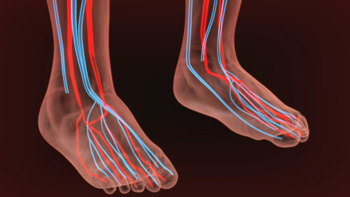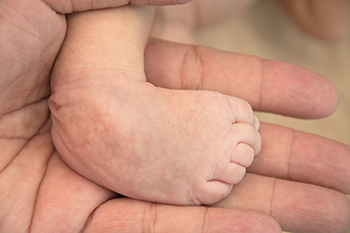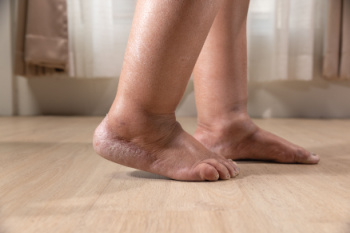Items filtered by date: October 2024
Recognizing Symptoms of Poor Foot Circulation

Poor foot circulation can lead to a range of concerning symptoms that may significantly impact your daily life. Common indicators include numbness, tingling, or a cold sensation in the feet. Individuals may also experience cramping, especially during physical activity, and slow-healing wounds or ulcers. Several underlying causes can contribute to poor circulation, including varicose veins, peripheral artery disease, atherosclerosis, and blood clots. Varicose veins can impede blood flow due to weakened valves, while peripheral artery disease restricts blood supply to the extremities. Atherosclerosis, caused by a buildup of fatty deposits in arteries, can further diminish circulation. Blood clots can obstruct blood flow entirely, causing severe complications. If your feet are affected by poor circulation, it is suggested that you consult a podiatrist for a comprehensive treatment plan.
Poor circulation is a serious condition and needs immediate medical attention. If you have any concerns with poor circulation in your feet contact Dr. Tupper of Coshocton Foot Health Center. Our doctor will treat your foot and ankle needs.
Poor Circulation in the Feet
Poor blood circulation in the feet and legs is can be caused by peripheral artery disease (PAD), which is the result of a buildup of plaque in the arteries.
Plaque buildup or atherosclerosis results from excess calcium and cholesterol in the bloodstream. This can restrict the amount of blood which can flow through the arteries. Poor blood circulation in the feet and legs are sometimes caused by inflammation in the blood vessels, known as vasculitis.
Causes
Lack of oxygen and oxygen from poor blood circulation restricts muscle growth and development. It can also cause:
- Muscle pain, stiffness, or weakness
- Numbness or cramping in the legs
- Skin discoloration
- Slower nail & hair growth
- Erectile dysfunction
Those who have diabetes or smoke are at greatest risk for poor circulation, as are those who are over 50. If you have poor circulation in the feet and legs it may be caused by PAD and is important to make changes to your lifestyle in order to reduce risk of getting a heart attack or stroke. Exercise and maintaining a healthy lifestyle will dramatically improve conditions.
As always, see a podiatrist as he or she will assist in finding a regimen that suits you. A podiatrist can also prescribe you any needed medication.
If you have any questions please feel free to contact our office located in Coshocton, OH . We offer the newest diagnostic and treatment technologies for all your foot and ankle needs.
Have Swollen Feet During Pregnancy?

Foot swelling, or edema, is a common occurrence during pregnancy, often resulting from increased fluid retention and hormonal changes. As the body prepares for childbirth, the growing uterus puts pressure on the blood vessels in the pelvis, which can impede circulation and lead to swollen feet and ankles. To find relief, pregnant women should elevate their feet whenever possible, stay well-hydrated, and wear supportive footwear. Gentle foot stretches can also improve circulation, and simple exercises like ankle rotations and toe stretches help promote blood flow. Additionally, taking regular breaks to walk around can alleviate discomfort. If your feet have become swollen during your pregnancy and you are experiencing worsening discomfort, it is suggested that you visit a podiatrist for treatment.
Pregnant women with swollen feet can be treated with a variety of different methods that are readily available. For more information about other cures for swollen feet during pregnancy, consult with Dr. Tupper from Coshocton Foot Health Center. Our doctor will attend to all of your foot and ankle needs.
What Foot Problems Can Arise During Pregnancy?
One problem that can occur is overpronation, which occurs when the arch of the foot flattens and tends to roll inward. This can cause pain and discomfort in your heels while you’re walking or even just standing up, trying to support your baby.
Another problem is edema, or swelling in the extremities. This often affects the feet during pregnancy but tends to occur in the later stages.
How Can I Keep My Feet Healthy During Pregnancy?
- Wearing orthotics can provide extra support for the feet and help distribute weight evenly
- Minimize the amount of time spent walking barefoot
- Wear shoes with good arch support
- Wear shoes that allow for good circulation to the feet
- Elevate feet if you experience swelling
- Massage your feet
- Get regular, light exercise, such as walking, to promote blood circulation to the feet
If you have any questions please feel free to contact our office located in Coshocton, OH . We offer the newest diagnostic and treatment technologies for all your foot and ankle needs.
Causes and Concerns Related to Tingling in the Feet

Tingling feet, often described as a pins-and-needles sensation, can arise from several underlying conditions. Diabetes is a major contributor, as high blood sugar levels can lead to diabetic neuropathy, which affects nerve function in the extremities. Multiple sclerosis is another condition that may cause tingling due to nerve damage affecting communication between the brain and body. Peripheral artery disease, or PAD, resulting in narrowed arteries, can reduce blood flow to the feet, leading to abnormal sensations. Kidney failure may also result in neuropathy caused by the accumulation of toxins in the body, affecting nerve health. Additionally, alcoholic neuropathy is a consequence of excessive alcohol consumption, damaging peripheral nerves. If you have developed this sensation in your feet, it is suggested that you consult a podiatrist who can offer you effective relief and treatment solutions.
Foot Pain
Foot pain can be extremely painful and debilitating. If you have a foot pain, consult with Dr. Tupper from Coshocton Foot Health Center. Our doctor will assess your condition and provide you with quality foot and ankle treatment.
Causes
Foot pain is a very broad condition that could be caused by one or more ailments. The most common include:
- Bunions
- Hammertoes
- Plantar Fasciitis
- Bone Spurs
- Corns
- Tarsal Tunnel Syndrome
- Ingrown Toenails
- Arthritis (such as Gout, Rheumatoid, and Osteoarthritis)
- Flat Feet
- Injury (from stress fractures, broken toe, foot, ankle, Achilles tendon ruptures, and sprains)
- And more
Diagnosis
To figure out the cause of foot pain, podiatrists utilize several different methods. This can range from simple visual inspections and sensation tests to X-rays and MRI scans. Prior medical history, family medical history, and any recent physical traumatic events will all be taken into consideration for a proper diagnosis.
Treatment
Treatment depends upon the cause of the foot pain. Whether it is resting, staying off the foot, or having surgery; podiatrists have a number of treatment options available for foot pain.
If you have any questions, please feel free to contact our office located in Coshocton, OH . We offer the newest diagnostic and treatment technologies for all your foot care needs.
A Brief Overview of Congenital Foot Deformities

Congenital foot deformities encompass a range of conditions that affect the structure and function of the feet from birth. Metatarsus adductus is characterized by an inward curve of the front of the foot, while clubfoot appears as a twisted position that may require intervention. Polydactyly involves the presence of extra toes, adding complexity to foot development. Another condition, congenital vertical talus, results in a rigid flat foot that can impact mobility if not treated early. Congenital curly toes refer to toes that curl under, which may cause discomfort or difficulties in walking. While these deformities can vary in severity, early diagnosis and appropriate treatment are essential for promoting healthy foot function and mobility. If your child suffers from a congenital foot deformity, it is suggested that you see a podiatrist who can prescribe the correct treatment and provide essential management tips.
Congenital foot problems require immediate attention to avoid future complications. If you have any concerns, contact Dr. Tupper of Coshocton Foot Health Center. Our doctor can provide the care you need to keep you pain-free and on your feet.
Congenital foot problems are deformities affecting the feet, toes, and/or ankles that children are born with. Some of these conditions have a genetic cause while others just happen. Some specific foot ailments that children may be born with include clubfeet, polydactyly/macrodactyly, and cleft foot. There are several other foot anomalies that can occur congenitally. What all of these conditions have in common is that a child may experience difficulty walking or performing everyday activities, as well as trouble finding footwear that fits their foot deformity. Some of these conditions are more serious than others. Consulting with a podiatrist as early as possible will help in properly diagnosing a child’s foot condition while getting the necessary treatment underway.
What are Causes of Congenital Foot Problem?
A congenital foot problem is one that happens to a child at birth. These conditions can be caused by a genetic predisposition, developmental or positional abnormalities during gestation, or with no known cause.
What are Symptoms of Congenital Foot Problems?
Symptoms vary by the congenital condition. Symptoms may consist of the following:
- Clubfoot, where tendons are shortened, bones are shaped differently, and the Achilles tendon is tight, causing the foot to point in and down. It is also possible for the soles of the feet to face each other.
- Polydactyly, which usually consists of a nubbin or small lump of tissue without a bone, a toe that is partially formed but has no joints, or an extra toe.
- Vertical talus, where the talus bone forms in the wrong position causing other bones in the foot to line up improperly, the front of the foot to point up, and the bottom of the foot to stiffen, with no arch, and to curve out.
- Tarsal coalition, when there is an abnormal connection of two or more bones in the foot leading to severe, rigid flatfoot.
- Cleft foot, where there are missing toes, a V-shaped cleft, and other anatomical differences.
- Macrodactyly, when the toes are abnormally large due to overgrowth of the underlying bone or soft tissue.
Treatment and Prevention
While there is nothing one can do to prevent congenital foot problems, raising awareness and receiving neonatal screenings are important. Early detection by taking your child to a podiatrist leads to the best outcome possible.
If you have any questions please feel free to contact our office located in Coshocton, OH . We offer the newest diagnostic tools and technology to treat your foot and ankle needs.
Medical Causes and Symptoms of Swollen Feet

Foot swelling, medically known as edema, occurs when excess fluid accumulates in the tissues of the feet. This condition can arise from various medical reasons, including heart failure, kidney disease, and venous insufficiency, where blood flow is impaired. It can also result from injuries, infections, or certain medications. Symptoms of foot swelling include noticeable puffiness, increased circumference of the foot, and discomfort or tightness in the affected area. In some cases, the swelling may be accompanied by pain or difficulty in movement. Identifying the underlying cause is vital for effective treatment and management. If your feet have become swollen, it is suggested that you confer with a podiatrist who can determine the cause and offer relief and treatment options.
Swollen feet can be a sign of an underlying condition. If you have any concerns, contact Dr. Tupper of Coshocton Foot Health Center. Our doctor can provide the care you need to keep you pain-free and on your feet.
Swollen feet are a common ailment among pregnant women and people who stand or sit for extended periods. Aging may increase the possibility of swollen feet and patients who are obese often notice when their feet are swelling too. There may be medical reasons why swollen feet occur:
- Phlebitis - A condition that causes the veins to become inflamed and can also cause leg pain.
- Liver disease - This may lead to low blood levels of albumin which is a protein. This can cause fluid in the blood to pass into the tissues and several areas of the body can become swollen.
- Heart failure - When the heart doesn’t pump properly the blood that is normally pumped back to the heart can pool in the veins of the legs causing swollen feet.
- Kidney disease - One of the main functions of the kidneys is releasing excess fluid in the body. This type of condition can make it difficult for the kidneys to function properly, and as a result the feet may become swollen.
- Deep-vein thrombosis (DVT)- This is a serious condition where blood clots form in the veins of the legs. They can block the return of blood from the legs to the heart which may cause the feet to swell. It is important to be treated by a podiatrist if this condition is present.
Swollen feet can also be caused by bone and tendon conditions, including fractures, arthritis, and tendinitis. Additionally, there may be skin and toenail conditions and an infection may cause the feet to swell. Patients who take medicine to treat high blood pressure may be prone to getting swollen feet.
Many patients elevate their feet to help relieve the swelling and this is generally a temporary remedy. When a podiatrist is consulted the reason behind the swelling can be uncovered and subsequently treated.
If you have any questions please feel free to contact our office located in Coshocton, OH . We offer the newest diagnostic tools and technology to treat your foot and ankle needs.


